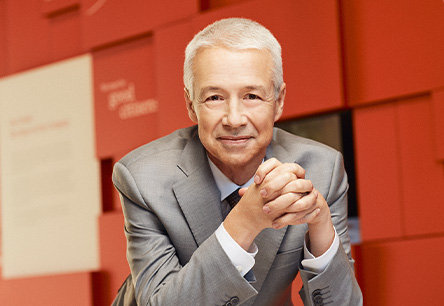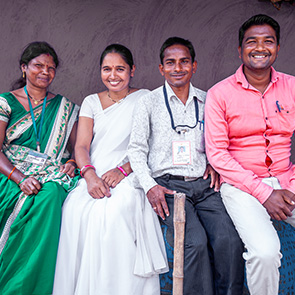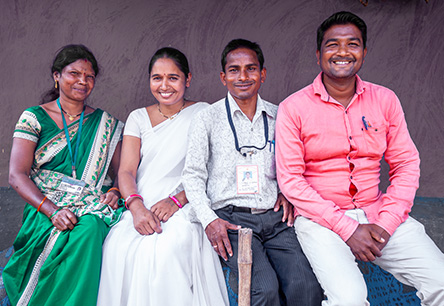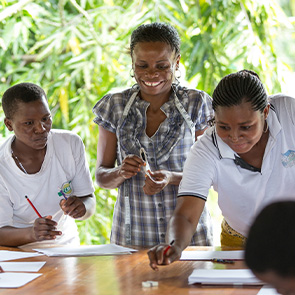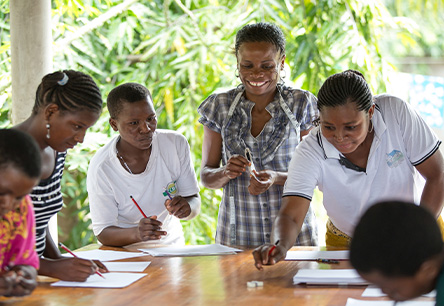Our supply base is an extension of our business and an important link to our customers around the world. In a large and diverse organization such as Johnson & Johnson, setting clear expectations of suppliers across all aspects of their interactions with us enables the best outcomes for our Company, our suppliers and all those we serve.
Shashi Mandapaty
Chief Procurement Officer,
Johnson & Johnson
To help us deliver on the high standards embodied in Our Credo, we seek relationships with suppliers who uphold the principles reflected in our Responsibility Standards for Suppliers. These Standards outline our expectations on a number of important topics and are integral to our supplier-selection process, helping us build a supply base that shares our commitment to strong ethics, quality and global citizenship. The Standards are periodically updated to align with current best practices and our own internal advances. In 2022, we updated our Responsibility Standards for Suppliers, including new sections covering:
- Supplier Diversity, Equity & Inclusion: Suppliers are expected to foster a culture of DEI within their own organizations and throughout their own supply bases.
- Information Security: Suppliers are expected to rigorously manage their business activities, employ appropriate information security practices to safeguard data and systems and maintain business continuity.
- Environmental Responsibility: Suppliers are expected to align with expanded requirements covering GHG reductions and the willingness to measure and publicly disclose data; increased focus on energy efficiencies; and integration of biodiversity considerations, recyclability and recycled material use.
We communicated the new Standards to our suppliers, supported by training and ongoing engagement.
We aim to work respectfully and collaboratively with all suppliers who engage with Johnson & Johnson. Our Supplier Sustainability Program (SSP) is a key tool to engage selected suppliers, requiring them to conform to our Responsibility Standards for Suppliers and regularly complete an assessment by EcoVadis, a recognized provider of business sustainability ratings for global supply chains. We also encourage transparency among our largest suppliers, encouraging them to publicly disclose their environmental performance, including GHG emissions and water use to CDP.
of invited suppliers participated in the CDP Supply Chain Climate Program
of invited suppliers participated in the CDP Supply Chain Water Program
Assessing and engaging suppliers on social risks
We continued to strengthen our processes and tools to assess, verify and address risks in our supply base as part of our compliance with laws and regulations and to check conformance to the Human and Labor Rights section of our Responsibility Standards for Suppliers. Our human rights in the supply base work included targeted due diligence of existing and potential suppliers, including the use of on-site SMETA (Pillar 4) audits and fuller investigations of potential high-risk commodities and supply chains. We also deployed two tech-enabled risk assessment tools: (i) using AI to gain upstream supply chain visibility of potential high-risk commodities, and (ii) embedding third-party modern slavery metrics in our SSP to assess potential supplier risks.
In 2022, we held the first dedicated human rights training session as part of our Onward Sustainability Training Program—launched in 2021 and part of our SSP—for suppliers, providing guidance on developing human rights policy commitments (see section: Human Rights).
Building supplier capabilities
In 2022 as part of Onward, Johnson & Johnson Procurement and Sustainability managers, in collaboration with the British Standards Institute, introduced new content to more than 1,000 suppliers in 45 countries. These sessions were designed to focus on specific practical areas for development such as measuring and reporting GHG emissions, starting a supplier diversity program and establishing health and safety policies for employees. Our intention is not only to support our own suppliers so that they can help Johnson & Johnson achieve our goals, but also to help suppliers drive responsible conduct through their own supply chains, resulting in greater efficiency, resilience and sustainable practice for a wide supply network. Since launch, the Onward sessions have had more than 1,300 attendees from our global supply base.
Engaging suppliers in innovation
Johnson & Johnson’s Supplier-Enabled Innovation Program allows us to generate innovative solutions through engagement with our supply base using an innovation technology platform. In 2022, Johnson & Johnson’s Procurement organization held its second annual Supplier-Enabled Innovation Awards event, recognizing the top innovations from these programs in 2021. Among the award winners were:
- Manufacturing design improvement: Working with a supplier, J&J MedTech was able to improve the performance of Ethicon’s flagship stapler by creating a new manufacturing process to deliver an enhanced design.
- Enhancing precision marketing capabilities: Our OTC team in China worked with a supplier to generate unique data insights from consumer behavior data to help engage consumers and meet their needs more effectively.
- Improving product sustainability: Johnson & Johnson Consumer Health in Brazil partnered with several suppliers to develop a sanitary napkin under our SEMPRE LIVRE brand that uses 50% less plastic and includes a pouch component that is made of 100% recyclable paper.
Partnerships for Good
We executed three new Partnerships for Good in 2022, advancing our progress toward our Health for Humanity 2025 Goal to collaborate with suppliers to create 10 solutions that drive environmental, social and economic improvements, bringing our total to six Partnerships for Good to date. The three new initiatives in 2022 were:
- Fair chance employment: This partnership with Kelly Services is designed to remove barriers to employment for contingent worker job candidates who may have been previously overlooked. In this program, Kelly Services works with Johnson & Johnson to evaluate existing policies on a job-category basis and to craft and introduce new policies that eliminate unnecessary barriers and develop new contingent assignment postings with more inclusive language.
- Recyclable pumps: This partnership with supplier Aptar enabled Johnson & Johnson Consumer Health to launch a recyclable pump for our AVEENO brand in European markets with potential for expansion internationally. With more than 100 million pumps used annually by AVEENO, this innovation has the potential to prevent huge volumes of plastic from entering our waste streams.
- Women’s Empowerment Initiative: Working with supplier Sodexo, this partnership focuses on women’s empowerment in EMEA and APAC, aiming to promote equal access for women to growth and opportunities in our workplaces. A program of initiatives, delivered jointly by Sodexo and Johnson & Johnson, includes mentoring, coaching, job-shadowing for women facing barriers to work, skilled volunteering opportunities and more.
Responsible sourcing
Throughout our business, we source commodities and raw materials, some of which require heightened procurement focus due to critical environmental or biodiversity concerns or elevated human rights risks in the supply chain. We work to understand the potential risks and impacts of our procurement activities in these areas and define appropriate standards and controls in responsible sourcing of commodities and raw materials of concern.
In particular, we maintain multiple multiyear forest partnerships to enable the protection of tropical rainforests that are critical for climate mitigation, wildlife conservation and long-term community well-being. We focus on palm oil, working with the Earthworm Foundation and BSR’s Action for Sustainable Derivatives initiative, and wood-fiber products, working with the Rainforest Alliance, to build transparency in our sourcing and supply and engage our suppliers in responsible practices. Examples of forest initiatives we continue to support include an initiative of the World Wildlife Fund to restore forests and protect more than 38,000 hectares of rainforest in Sumatra, Indonesia, and an initiative with the Forest Conservation Fund in Loreto, Peru, to prevent the deforestation of 10,000 hectares of pristine Amazon rainforest.
Conflict minerals
As members of the Responsible Minerals Initiative and in line with regulatory requirements, we remain committed to taking steps to determine the use, country of origin and source of tin, tungsten, tantalum and gold in our global product portfolio.


